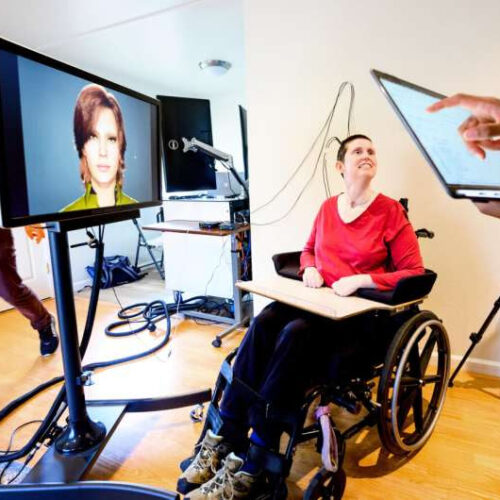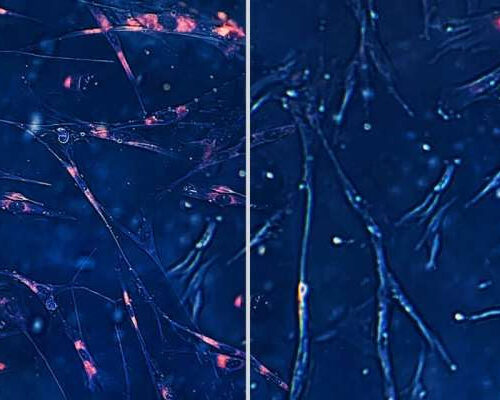by Nagoya University Scientists build on artificial intelligence to create next-generation gastric acid treatment. Credit: INTAGE HOLDINGS Inc.Researchers at Nagoya University in Japan have created and improved artificial intelligence (AI) designs to synthesize a candidate compound for a new gastric acid inhibitor with a better binding affinity than existing drugs. Their findings, published in Communications Biology,...
Tag: <span>Artificial Intelligence</span>
How artificial intelligence gave a paralyzed woman her voice back
by Stanford University Medical Center A research participant in the Dr. Edward Chang’s study of speech neuroprostheses, is connected to computers that translate her brain signals as she attempts to speak into the speech and facial movements of an avatar on Monday, May 22, 2023, in El Cerrito, Calif. At left is UCSF clinical research...
Harnessing artificial intelligence for better patient care
by Jennifer Monahan, Carnegie Mellon University Credit: Pixabay/CC0 Public Domain The integration of artificial intelligence (AI) provides one of the most promising—and fraught—advancements in the ever-evolving landscape of the health care sector. Electronic records let physicians access patient information more easily. Phone apps and web-based tools allow users to schedule appointments and check test results online....
New Artificial Intelligence Program Could Help Treat Hypertension
Artificial intelligence model helps match people with high blood pressure to the medication most likely to work. For the nearly half of Americans with hypertension, it’s a potential death sentence; it increases the risk of stroke and chronic heart failure. While it’s relatively easy to prevent or moderate if caught early — eat well, exercise more,...
AI Helps Show How The Brain’s Fluids Flow
Posted Yesterday New research targets brain diseases including Alzheimer’s. A new artificial intelligence-based technique for measuring fluid flow around the brain’s blood vessels could have big implications for developing treatments for diseases such as Alzheimer’s. The perivascular spaces that surround cerebral blood vessels transport water-like fluids around the brain and help sweep away waste. Alterations in the...
Why the artificial intelligence debate sounds like a foreign language
PUBLISHED SUN, MAY 21 202310:00 AM EDT UPDATED SUN, MAY 21 202311:55 AM EDT Kif Leswing@KIFLESWING The language around the AI debate reveals a major rift in how academics, politicians,and the technology industry believe that AI should regulated. Some are worried about “AI safety,” a term that describes possibility of building an unfriendly, superpowerful computer...
Artificial Intelligence Catalyzes Gene Activation Research and Uncovers Rare DNA Sequences
Posted Today Scientific demonstration with machine learning reveals ‘extreme’ genes – DNA sequences with custom-tailored activities. Artificial intelligence has exploded across our news feeds, with Chat GPT and related AI technologies becoming the focus of broad public scrutiny. Beyond popular chatbots, biologists are finding ways to leverage AI to probe the core functions of our genes....
Artificial intelligence provides new insight into preventing human disease
A molecular machine, which plays an essential ‘cargo’ role in controlling the delivery of proteins to the surface of human cells, and is implicated in several diseases, has been identified in a landmark study using artificial intelligence (AI). The research, led by an international team of scientists, is published in Cell. Researchers at the Universities of...
Artificial intelligence identifies anti-aging drug candidates targeting ‘zombie’ cells
by Ten Bridge Communications Senolytics are an emerging class of investigational drug compounds that selectively kill aging-associated senescent cells (left, with red stain) without affecting other cells (right). Using artificial intelligence, researchers from Integrated Biosciences have, for the first time, identified three senolytics with comparable efficacy and superior drug-like properties relative to leading investigational compounds....
AI predicts future pancreatic cancer
AI model spots those at highest risk for up to three years before diagnosis Peer-Reviewed Publication HARVARD MEDICAL SCHOOL An artificial intelligence tool has successfully identified people at the highest risk for pancreatic cancer up to three years before diagnosis using solely the patients’ medical records, according to new research led by investigators at Harvard...






